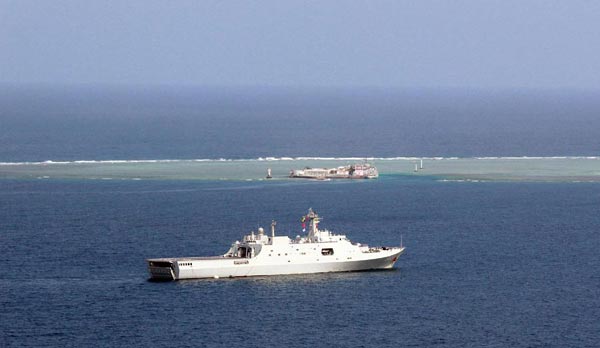 |
|
China firmly upholds her sovereignty and maritime rights and interests in the South China Sea. [Photo/Xinhua] |
Echoing the US-led chorus criticizing China's reclamation and construction work in the South China Sea, Australian Defense Minister Kevin Andrews has made quite a few hard-line remarks. Canberra may be eager to prove its allegiance to Washington, but if it believes that it can help contain China by jumping on to the US bandwagon, it is wrong.
In his speech at the Shangri-La Dialogue in Singapore on May 31, the Australian defense minister made it clear his country's stance on China's reclamation work is pretty much similar to the views expressed by US Secretary of Defense Ashton Carter at the security forum.
In his speech, interpreted by Australian media as Canberra's strongest statement on the reclamation issue, Andrews called for a halt to large-scale reclamation work and militarization in the waters of the South China Sea, and hinted that Australia could join the US and other countries in opposing China if it didn't stop reclamation.
Andrews talked at length about freedom of navigation in the South China Sea at the forum, as if it was already an issue of great concern. In an interview to Australian media on June 1, he said Canberra would continue flying military aircraft over the disputed waters in the South China Sea even if Beijing unilaterally imposed a restricted air zone.
Responding to such speculations, Admiral Sun Jianguo, deputy chief of the General Staff of the People's Liberation Army, told reporters on the sidelines of the Shangri-La Dialogue that China has never said it will establish an air defense zone over the South China Sea, which makes Australia's concern unnecessary.
As a country thousands of miles away from the South China Sea, Australia has nothing to do with the disputes and should have been wise enough to keep away from them. But because of its military alliance with the US, Australia feels obliged to follow in the footsteps of Uncle Sam, especially in the Asia-Pacific region.
Though Australia realized long ago that the US' influence in the region is waning, it still deems the US as its closest ally and attaches utmost importance to their bilateral ties. This could explain why Australia appeared enthusiastic about strengthening its military alliance with the US when the latter set out to implement its "pivot to Asia" strategy a few years ago.
Given that the US strategy is overtly aimed at containing China, Australia, along with the US, has sounded increasingly assertive on the territorial disputes between China and some of its neighboring countries. In November 2014, it joined the US to vehemently oppose the establishment of China's Air Defense Identification Zone over the East China Sea, and by doing so it dealt a heavy blow to Sino-Australian ties.
Since Australia sees the Asia-Pacific with greater strategic interest, it has been increasingly interfering in the South China Sea issue, and Andrews' remarks once again proved that. Besides, Australia has also taken part in joint military exercises with the US and the Philippines near the disputed waters.
Washington said many times that it does not take sides in the South China Sea disputes. Australia sang the same tune. But when Washington appeared to change its stance, Canberra did the same. The question is: When will Australia adopt a more "independent" foreign policy?
As its largest trading partner, China is no doubt an important country for Australia. People with insight in both countries have been saying that Australia should not compromise its relations with China while strengthening its alliance with the US.
The growing size of bilateral trade and the frequency of people-to-people interaction are clear proof that there are no fundamental differences between China and Australia. The two countries have everything to gain by steering clear of unnecessary conflicts and keeping their ties on a healthy track.
The author is a senior writer with China Daily. wanghui@chinadaily.com.cn